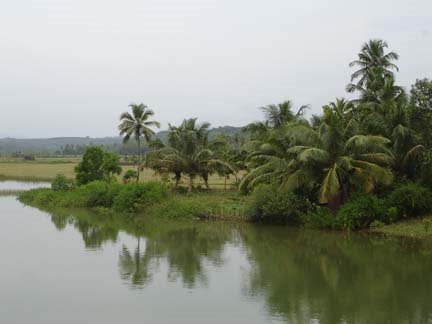Have
you ever wondered about the meaning or origin of the place name Padukone? It is
likely you thought about it sometime, since the place name has been made
popular by the Bollywood actress Deepika Padukone or earlier by her illustrious
father ace Badminton champion Prakash Padukone.
Anyway,
the village known as ‘Padukone’ is located in Kundapur Taluk, Udupi District,
Karnataka. Northern news readers prefer to pronounce it as ‘PaDukON’ whereas
the locals of Kundapur call it simply as ‘PaDukONe’.
As
such, the term PaDu-kONe in present Kannada means western room! [‘paDu’= West;
‘kONe’ (1) =room]. However the word ‘KoNe’ may also mean: (2) angle or angular
corner (‘kona’) or (3) male species of buffalo (kONa).
(4) The term Koni as used in Kerala can
also mean a ladders or stretchers made of
bamboo and kusa grass or straw which are
traditionally used to carry corpses.
Interestingly,
the actual and original source of the word ‘KoNe’ in the place name under study
may be anything other than the four explained above!
Words
are wonderful units as building bricks of languages. At the same time, it is to
be pondered that any region has thousands of years of civilization consisting
of obscure undocumented history and what is at present the prevalent language
in the region (like Kannada or Tulu) could have evolved and replaced what was
earlier in usage in the remote past.
Konni : the tribe and language
African
continent widely known in science circles as cradle of human evolution still
contain evidences of tribes and languages that migrated from their homeland
before multiple millennia. Koni, Kona or Akona tribes and Konni language still
prevails in parts of Africa like Ghana. Places named after Koni Like Wacha Koni
can be found in African States like Kenya. And also in Mediterranean island
countries like Cyprus.
Migration
of African tribes in the past, thousands of years ago to parts of southern
India and formation of settlements named after them. Settlements of Koni or
Akona tribes with passage of time have been modified variously as Koni, Konaje,
Konalu, Konandur, Konankunte, Konanhundi, Padukone etc. Besides place names, surnames
like’ KonI’ or ‘Goni’ still remain among some of the south Indians. There is a
Koni Amman Temple in Coimbatore, Tamilnadu.
Koni villages
Villages
named after the ancient Koni (Konni) tribes can be found spread all over India.
Check some of the following place names bearing the signature of tribe Koni :
Koni 1 (.Kundapur
Taluk, Karnataka)
Konni 2. (Pathanamthitta
district, Kerala)
Koni 3 (Near Bilaspur, Madhya Pradesh)
Koni 4. (Sant Kabir Nagar District, Uttar
Pradesh.)
Koni 5 (Ganganagar District, Rajastan).
Koni 6 (Nagpur District, Maharastra)
Koni 7 (Arwal District, Bihar).
Koni 8 (Satna District Madhya Pradesh)
Bada-koni (Bilaspur, Chattisgarh).
Padu-kone. (Kundapur Taluk)
Kambada-kone. (Kundapur Taluk.)
Konaje. (Mangalore Taluk)
Padu-konaje. (Mangalore Taluk)
Mudu-konaje. (Mangalore Taluk.)
Konalu.(Puttur Taluk)
Konchadi (Mangalore)
Konandur. (Shimoga District)
Konanur .(Hassan District)
Konan-kunte. (Bangalore .)
Kumbha-konam (Tamilnadu)
Koni dena (Andhra Pradesh).
Koni dela (Andhra Pradesh).
Konark. (Orissa).
And so on.
Alternate
Names
Kona (or Akona) language and speakers or tribes were also known by alternate
names such as ‘Koma’ or ‘Komang’. We have discussed some aspects
of ’Kom’ or ‘Koma’ tribes in earlier posts. Kom(a) tribes could have been a
variants of the Kona tribes.
Konkana
The northern part of West Coast between
Mumbai and Goa is usually known as Konkan. The origin of the word Konkan has
been explained variously. It appears that that it could have originally been Kom-kona,
a region of Kom(a) sect of Kona tribes.
Gokarna
By similar analogy the original name of the
place now famous as Gokarna in
Uttara Kannada district could have been ‘Goy-Kona’
where the words Goy (also known as ‘Koi’) represent another variant of Kona
tribes.
Kamangi
Kamangi
is a Kannada slang of uncertain origin denoting a silly person. It is possible
that the derogatory term originated from the Komang tribes that inhabitated parts of Deccan, in the past.
Padukone
and Koni
After an overall analysis of the place
names relevant to Koni, I hope you are convinced about the ethnonym status of
these place names. In summary, the Padukone
village could have been originally known as ‘KoNi’ which was corrupted into ’KoNe’
in the parlance. The large ‘KoNi’
village was subsequently split into western ‘Padu-KoNi’ and eastern ‘MuDu-KoNi’.
This is also the case with PaDu-Konaje
and MuDu-Konaje, where Konaje
represented an area (-aje or -anje) inhabited by Kona tribes.
Ò
Uם�#� 

